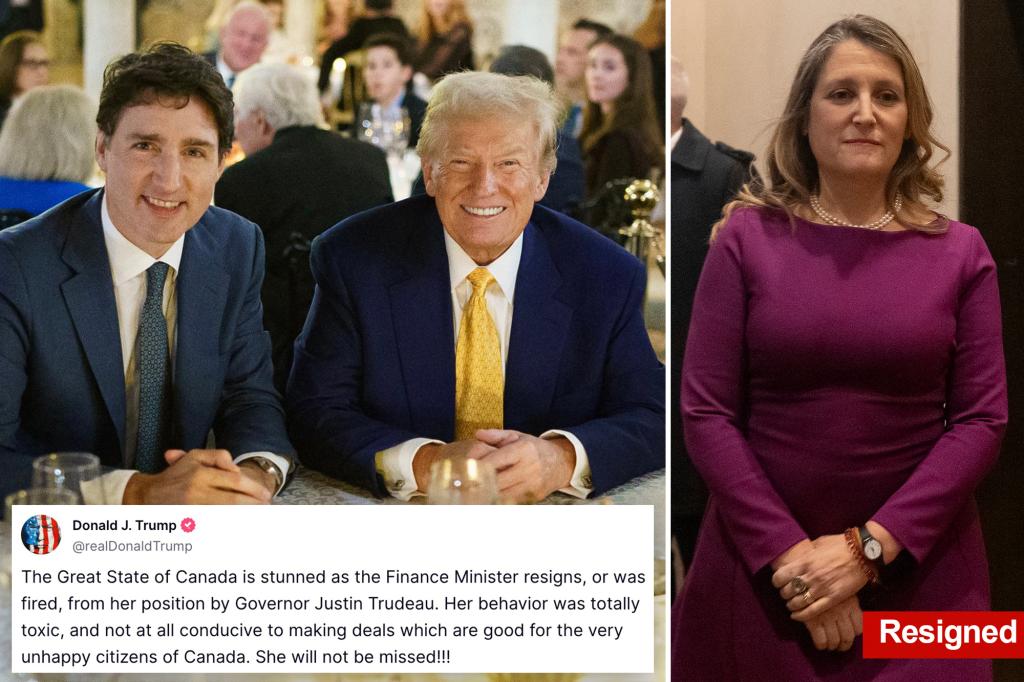The unexpected resignation of Canada’s Finance Minister, Chrystia Freeland, sent shockwaves through the Canadian political landscape and became fodder for commentary from former US President Donald Trump. While the official reasons cited for her departure revolved around policy differences within the Trudeau government, the timing, occurring shortly after a clash with the US over impending tariffs, fueled speculation about a deeper connection. Trump, never one to shy away from controversy, seized the opportunity to criticize both Freeland and Trudeau, characterizing the former as “toxic” and suggesting her absence would be a positive development for Canada. This public intervention further complicated an already delicate situation, highlighting the strained relationship between the two North American neighbors and raising questions about the future of their economic cooperation.
Freeland’s resignation unfolded against the backdrop of growing trade tensions between Canada and the United States. The Trump administration, known for its protectionist stance, had threatened to impose tariffs on Canadian imports, a move that could have significant repercussions for the Canadian economy. Freeland, a staunch defender of free trade, had been at the forefront of negotiations with the US, attempting to mitigate the potential damage. Her sudden departure, coupled with Trump’s subsequent remarks, suggested a breakdown in communication and a hardening of positions on both sides. This incident served as a stark reminder of the vulnerabilities inherent in the close economic ties between the two countries and underscored the challenges of navigating international relations in an era of rising nationalism and trade disputes.
The nature of the policy disagreements that ultimately led to Freeland’s resignation remains a subject of debate. While some sources pointed to internal divisions within the Liberal Party over the best approach to handling the tariff threats, others speculated that external pressures, including Trump’s aggressive rhetoric, played a significant role. Freeland’s departure, regardless of the specific reasons, left a void in the Canadian government’s economic leadership at a critical juncture. Her replacement would face the daunting task of navigating the complex trade relationship with the US while simultaneously addressing domestic economic concerns. The situation called for a delicate balancing act, requiring both firmness in defending Canadian interests and a willingness to engage in constructive dialogue to avoid further escalation of tensions.
Trump’s public pronouncements following Freeland’s resignation added another layer of complexity to the situation. His characterization of her as “toxic” and his suggestion that she would not be missed were seen by many as inflammatory and unhelpful. These remarks, delivered via his Truth Social platform, served to further personalize the trade dispute and potentially undermine efforts to find common ground. Trump’s intervention, while not entirely unexpected given his history of provocative statements, nonetheless highlighted the challenges of maintaining a stable and productive relationship with the United States under his leadership. His willingness to publicly criticize a key figure in the Canadian government risked exacerbating existing tensions and complicating future negotiations.
The implications of Freeland’s resignation and Trump’s subsequent comments extended beyond the immediate context of the trade dispute. The incident raised broader questions about the future of Canada-US relations and the ability of the two countries to effectively cooperate on a range of critical issues. The close economic ties between Canada and the United States, traditionally a source of mutual benefit, had become increasingly fraught with tension under the Trump administration. The unpredictable nature of US policy and the president’s penchant for aggressive rhetoric created a climate of uncertainty and made it difficult for Canada to plan its economic strategy. The situation underscored the need for Canada to diversify its trade relationships and reduce its dependence on the US market.
The Freeland resignation episode also highlighted the challenges faced by political leaders in navigating the complex dynamics of international diplomacy. The pressure to defend national interests while simultaneously maintaining productive relationships with key allies often requires difficult choices and a delicate balancing act. Freeland’s departure, whether voluntary or forced, served as a reminder of the personal toll that such high-stakes negotiations can take. Her successor would need to possess not only strong economic expertise but also the diplomatic skills necessary to navigate the turbulent waters of international relations, particularly in the context of a rapidly changing global landscape and an increasingly assertive United States under the leadership of Donald Trump.

